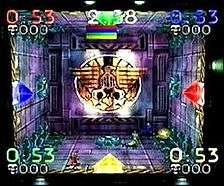Blast Chamber
| Blast Chamber | |
|---|---|
 | |
| Developer(s) | Attention To Detail |
| Publisher(s) | Activision |
| Platform(s) | DOS, PlayStation, Saturn |
| Release date(s) |
PlayStation
‹See Tfd›
‹See Tfd›
Saturn
‹See Tfd›
PC
|
| Genre(s) | Action |
| Mode(s) | Players: 1-4 |
Blast Chamber (Kyu-Bakukku) is a video game released on PC, Sony PlayStation and Sega Saturn.
Gameplay
Single-player mode
In the single player game, the player navigates through 40 different cube-shaped puzzles, known as chambers. The player must collect a crystal orb and drop it off in the reactor before time runs out or the player explodes and must start over. The game places heavy emphasis on the ability to kick the walls of the cube at certain points which causes the entire chamber to rotate, which is vital to that player reaching the end of each puzzle. Obstacles range from platforms, to spike pits, to giant fans. In addition, some "kickers" (switches in the form of green arrows) are placed on some walls to mislead the player. There are even some flashing platforms that will rotate the chamber 180 degrees when the player jumps on them. Once the crystal is dropped off in the reactor, the player moves on to the next level. After each level, the player is awarded 100 points for each second remaining on their timer. For every 10,000 points, the player gains an extra life. If the player makes it through all 40 chambers without using any cheat codes, there is an animation at the end. If even one cheat code is used, the player is prompted the message: "You made it! You're alive! You cheated. You're outta here." Single player mode is always 'Red Player'.
Eliminator mode

This mode has up to four computer-controlled or human players face off against each other in 1 of 20 different chambers. The winner is the last one alive at the end. Each player has C4 strapped to their suit with a timer continuously counting down. However, when a player possesses the crystal, that player's "Kill Clock" freezes until they put it in a reactor or lose it by being pushed or falling. Each player has a small pyramid holochamber assigned to them (one on each "side" of the chamber belonging to each of the players and color-coded to match) in which they can bring a crystal that is dropped at the beginning of the level to extend the amount of time on their timer. The other players will try to grab the crystal, by pushing its bearer and causing them to fall by rotating the chamber. Alternatively, a crystal can be dropped in a different player's chamber to cut off time from their timer. How much time is gained or lost when a crystal is placed in a reactor depends on the difficulty. Also, on Conflagration or Thermonuclear difficulty, if a player blows up and another player is standing too close, both players are blown up simultaneously. Once an orb is dropped off into a chamber, falls on spikes, falls in a pit, or blows up via the "Crystal Bomb" powerup, another one will appear.
Free-for-all mode
This mode is very similar to Eliminator Mode, except that there is a fixed amount of time that the game will go on for, and each player has an unlimited number of lives. The player who dies the least amount of times is the winner. Adding and losing time on the timer is the same as in Eliminator Mode, where the crystal is dropped off in different players' squares.
Development
According to Tom Sloper (senior producer) and Marc Metis (product producer) of Activision, "We wanted our product to be unique. With so many first-person shooters - so many driving games, we wanted to make something different that made a game what it's supposed to be - an original game that draws people in. We wanted to make a game that's fun with one, two, three or four players."[1]
References
- ↑ "Behind the Screens". Electronic Gaming Monthly. Ziff Davis (85): 75. August 1996.
- Blast Chamber (PlayStation) at GameSpot (Infobox details)
- Blast Chamber (Sega Saturn) at GameSpot (Infobox details)